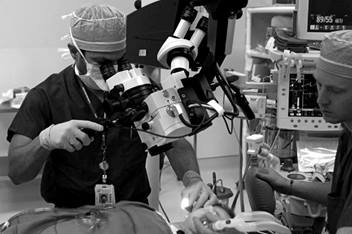Speech and Communication Evaluations for Babies with Hearing Loss

Babies begin communication as early as birth. This takes many forms before the actual use of words. Most babies learn non-verbal ways to make their wants and needs known. These ways include:
- Sounds (crying, cooing, squealing)
- Facial expressions (eye contact, smiling, grimacing)
- Gestures or body movements (moving legs in excitement or distress, and later, gestures like pointing)
Diagnosis
- Your baby will have a Newborn Hearing Screening shortly after birth. If this test shows possible hearing loss, an audiologist will do a second test to confirm that there is hearing loss.
- Next, your baby will see an Ear, Nose and Throat (ENT) doctor. The doctor will examine your baby to determine the potential cause of the hearing loss and make medical recommendations for the treatment of the hearing loss.
The doctor will usually place a referral for the baby to see a speech pathologist at the ENT appointment.
Timeline for Services or Intervention
Babies diagnosed with hearing loss are at high risk for communication (learning to listen and speak) delays. The brain is most adaptable to change and learning in the first three years of life.
There are certain ages by which early intervention will best help babies with hearing loss. These are the ages when your baby will be usually be ready for these services:
| By this age | These services should be started |
|---|---|
| 2 to 3 months | Hearing loss diagnosed |
| 3 to 4 months | Fitted with hearing technology |
| 3 to 6 months | Communication evaluation and early intervention |
| By 12 months | Communication re-evaluation |
| Every 6 months until age 3 | Communication re-evaluations |
| After age 3 | Annual communication evaluations |
Treatment
Early intervention by a speech pathologist is critical to minimize delays in babies’ communication and listening skills. Speech pathologists are trained in early communication strategies. They also teach techniques that parents and caregivers can use to help lessen these delays.
You will meet with a speech-language pathologist from the hearing team to discuss your communication goals for your baby. The speech-language pathologist can then tell if your baby’s responses are similar to those of typical same-aged hearing peers.
Here are some of the things you can expect at this visit:
- You will be asked some questions about:
- Your baby’s current responses to sound in their environment
- Their early non-verbal communication skills
- Early language stimulation ideas will be discussed, including:
- Joint attention (both the caregiver and the child paying attention to the same object or activity)
- How to teach your baby to listen
- How to help your baby retain and use the hearing technology
- Early literacy skill development
- The speech-language pathologist will help you to understand how your baby’s hearing loss may affect speech and language development and communication during the early years
Follow-Up
A staff scheduler will contact you to find a day and time that is good for you to bring your baby for this first communication evaluation:
If you have questions about the referral or about the scheduling of this visit, please call 614-722-2200.
HH-IV-211 12/19 | Copyright 2019, Nationwide Children’s Hospital

